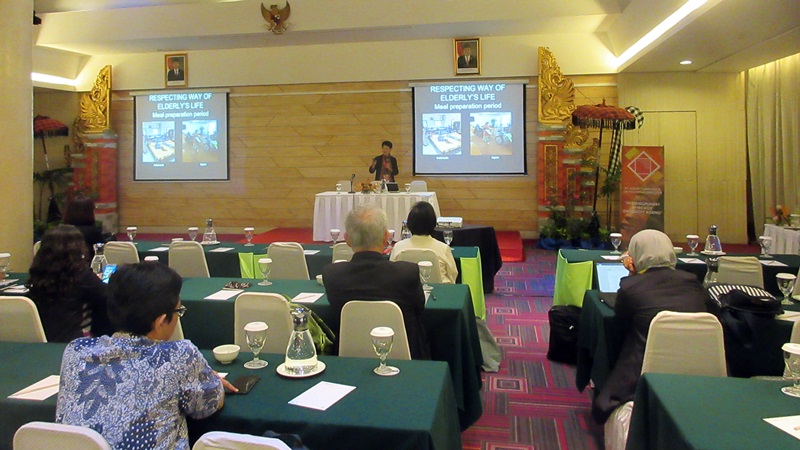ERIA Research Shows that Caregiving Reflects Socio-Cultural Values of Care Settings  Â
Date:
3 October 2019Category:
NewsTopics:
HealthcareShare Article:
Print Article:
Bali, 3 October 2019: An ERIA study on the transfer of skills and knowledge by cross-border caregivers found that it is important to consider the socio-cultural background of the care settings of target countries and communities, because acts of care reflect the social and cultural values of each care setting. One of the principal investigators of this project, Prof Yuko Hirano of Nagasaki University, presented the findings of this project in the 2nd ASEAN Conference on Healthy Ageing (ACHA) 2019 with the theme ‘Interdisciplinary Approach on Healthy Ageing’ in Bali, 1-3 October 2019.
The project was launched in 2018 by ERIA, Nagasaki University of Japan and Universitas Respati Indonesia. Prof Hirano said that the three-year project aimed to develop a standardised oral care module which would be applied to the education of Indonesian caregivers in Indonesia. She gave an example of the ways socio-cultural background can affect caregiving. Japanese care workers are working under a systematically developed care plan, in accordance with the regulation of Long-Term Care Insurance Act (LTC Act). Thus, care workers in Japan are punctual in keeping the daily schedule, although they seem too busy to promptly respond to the individual request of the elderly. On the other hand, care workers in Indonesia are sufficient in number per care receiver; therefore, they are able to spend longer hours with the elderly in response to the needs of individuals. The care workers from two countries seem to contrast, but are actually not contradictive. If one wishes to transfer care technology, it is necessary to carefully study the care settings of Indonesia, and to merge the advantages of care of both Japan and Indonesia, to maintain a better Activities of Daily Living (ADLs) by keeping a high Quality of Life of the individual elderly.
Academics, researchers, practictioners, and professionals from various countries who are interested in healthy ageing issues attended this biennial event organised by Universitas Respati Indonesia, Universitas Udayana Bali, and the Malaysia Healthy Ageing Society (MHAS). This two-day conference discussed a range of topics related to ageing, from scientific aspects (health sciences) to economic and social aspects.
On the first day of this conference, Dr Maliki, an Expert in Ageing studies in Indonesia and Director of Poverty Alleviation and Social Welfare, Ministry of National Development Planning (BAPPENAS) opened the conference with his keynote speech. Dr Maliki described three challenges for Indonesians when facing population ageing: low pension coverage, poverty rates, and vulnerable elderly women. To overcome these challenges, the Government of Indonesia, through Presidential Decree on National Strategy of Ageing, launched five strategies and policy directions: 1. Social Protection; 2. Healthier Ageing Population; 3. Build People Awareness; 4. Caregiver and institutional arrangement; 5. Respect and fulfillment of the rights of older people. After the keynote speech, Dr Maliki, as representative from BAPPENAS, together with Prof Dr dr A.A. Raka Sudewi, President of Universitas Udayana and dr Ketut Suarjaya, MPPM, representative from the Provincial Government of Bali officially opened the conference.
The closing speech was delivered by the Chairman of the Conference, followed by the declaration of the Indonesian Healthy Ageing Society. The declaration stated that Healthy Ageing should be achieved through intergenerational collaboration. It means that this policy is not only for the quality of life for older people but also life-course issues including younger generation. That is why it is imperative to develop a society in which people of all generations can contribute to and discuss Healthy Ageing in order to make it sustainable.








